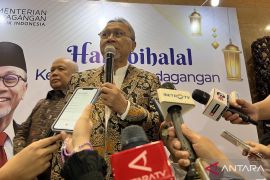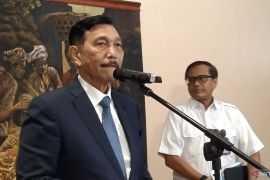"I was distressed to hear accounts of violent attacks, forced displacement, denial of identification cards and other forms of discrimination and harassment against them," Pillay stated.Jakarta (ANTARA News) - The United Nations (UN) High Commissioner for Human Rights, Navanethem Pillay, said that the Indonesian government should implement international human rights standards in its legislative regulations, at the local and national levels.
"In my discussion with the government, I stressed the importance of translating Indonesia`s international human rights obligations into the domestic law," she stated in a press conference at the United Nations Information Centre (UNIC), on Tuesday.
She also said that the international human rights standards have been applied in several countries. Therefore, she urged the government to do the same.
"This process has started in many areas. Hence, I encourage Indonesia to continue with this and resist any backsliding in legislative standards at the local and national levels," she expressed.
During her visit to Indonesia, she met several Indonesian ministers and officials, as well as representatives from disadvantaged and excluded communities.
"Indonesia has given me the impression of a country of great diversity, which has been through major transformations in a very short period of time," Pillay said.
However, she added that the country has yet to strengthen accountability mechanisms, aimed at identifying responsibilities for past and present human rights violations.
The UN High Commissioner also had the opportunity to meet the representatives from the Ahmaddiya, Christian, Shia and traditional belief communities.
She expressed concern over human rights violations against minorities in Indonesia.
"I was distressed to hear accounts of violent attacks, forced displacement, denial of identification cards and other forms of discrimination and harassment against them," Pillay stated.
"I was also concerned that the police had failed to provide adequate protection in these cases," she added.
Therefore, she recommended the government to amend or repeal the 1965 Blasphemy Law, the 1969 and 2006 ministerial decrees on building houses of worship and religious harmony, and the 2008 Joint Ministerial Decree on Ahmadiyya.
"Of course, issues of community violence are complex and cannot be solved easily. However, I was particularly concerned about the statements made by officials, who are promoting religious discrimination," she said.
Pillay also urged the government to resolve the human rights violations that have occurred in the past, including murders of several students in the late 1990s and the crimes in Aceh and East Timor (what is now Timor Leste).
However, she expressed regret at the way the past human rights cases were handled. She believes that there have not been credible prosecutions of perpetrators.
"There is a need to strengthen the political will to address serious human rights violations that took place in the past," she said.
Pillay added that the world is waiting for justice on the murder of the human rights defender, Munir Said Thalib, which took place in 2004.
"I have requested a new investigation for this case, in order to establish clear responsibilities of the murder," she expressed.
Furthermore, she said that the UN agency for human rights has offered to help the government to promote human rights and best practices.
"We will be glad to help in every possible way to improve the human rights conditions in Indonesia," she stated.
Navi Pillay arrived in Bali on November 7 to attend the fifth Bali Democracy Forum. She then visited Jakarta after getting an invitation from the government.
During her visit to Jakarta, Pillay met key personnel from the government, UN organisations and the diplomatic community, and national human rights institutions.(*)
Editor: Heru Purwanto
Copyright © ANTARA 2012











